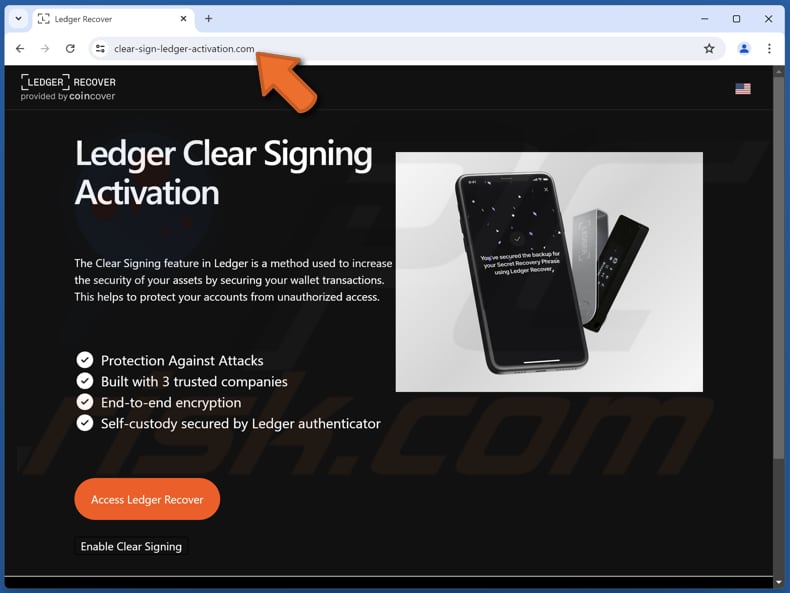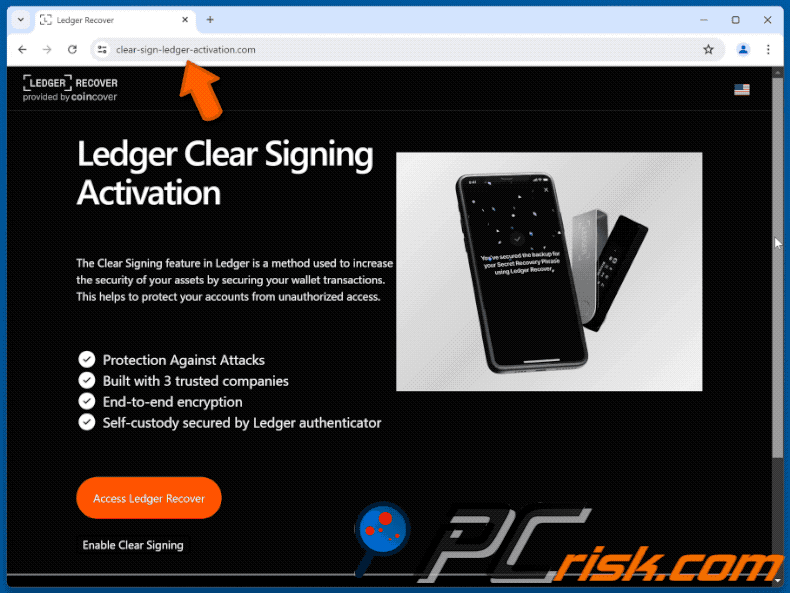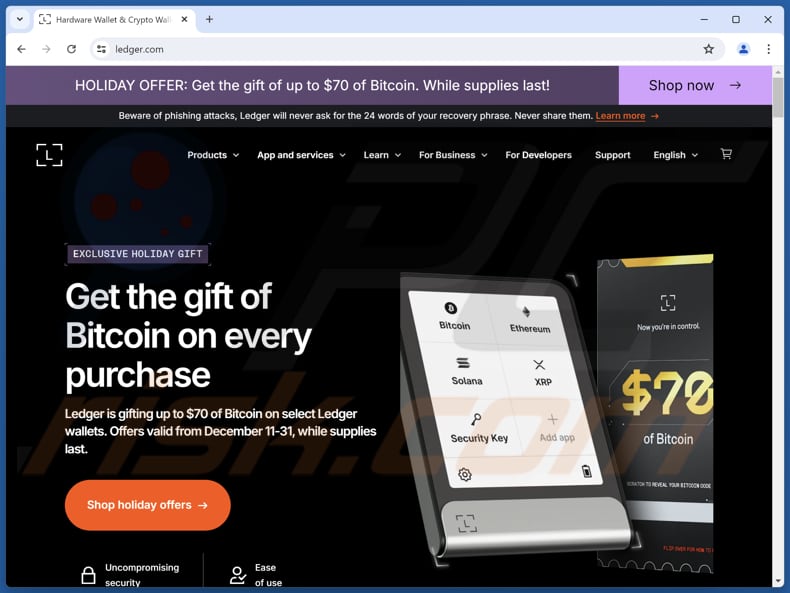How to avoid scams like the fake "Ledger Clear Signing Activation" page
Phishing/ScamAlso Known As: Fake Ledger Clear Signing Activation website
Get free scan and check if your device is infected.
Remove it nowTo use full-featured product, you have to purchase a license for Combo Cleaner. Seven days free trial available. Combo Cleaner is owned and operated by RCS LT, the parent company of PCRisk.com.
What kind of scam is the fake "Ledger Clear Signing Activation" site?
We have inspected the website (clear-sign-ledger-activation[.]com) and found that it imitates the real page (ledger.com) to trick unsuspecting users into revealing their recovery phrases. Falling for this scam can result in monetary loss. Thus, users should always examine web pages before disclosing personal information or taking other actions.

"Ledger Clear Signing Activation" fake platform in detail
Ledger (ledger.com) provides secure hardware wallets for managing digital assets like crypto and NFTs. Its products help users securely store and manage their digital value. Ledger aims to make digital ownership accessible to everyone and ensures users can confidently navigate the growing "Internet of Value".
The fake website (clear-sign-ledger-activation[.]com) shares a similar design to appear legitimate. It encourages users to activate the "Ledger Clear Signing" feature to increase the security of their assets. On this page, users are instructed to "Access Ledger Recover" to enable "Clear Signing".
During this process, users are requested to provide their recovery seed phrase. The entered information is sent to scammers. With these details, scammers can access cryptocurrency wallets and steal cryptocurrency holdings. They can transfer the funds from the victim's wallet to their own.
Cryptocurrency transactions are irreversible, meaning once a transaction is completed, it cannot be undone or reversed. This makes it crucial to be cautious when dealing with crypto, as falling for fake websites or scams can result in permanent financial loss.
| Name | Fake Ledger Clear Signing Activation website |
| Threat Type | Phishing, Scam, Social Engineering, Fraud |
| Fake Claim | Users have to enter thei recovery phrase to proceed |
| Disguise | Legitimate Ledger platform |
| Related Domain | clear-sign-ledger-activation[.]com |
| Detection Names (clear-sign-ledger-activation[.]com) | Cluster25 (Phishing), CRDF (Malicious), CyRadar (Malicious), Fortinet (Phishing), Kaspersky (Phishing), Full List Of Detections (VirusTotal) |
| Symptoms | Fake error messages, fake system warnings, pop-up errors, hoax computer scan. |
| Distribution methods | Compromised websites, stolen of fake social media profiles, deceptive emails, shady ads, unwanted applications. |
| Damage | Loss of sensitive private information, monetary loss. |
| Malware Removal (Windows) |
To eliminate possible malware infections, scan your computer with legitimate antivirus software. Our security researchers recommend using Combo Cleaner. Download Combo CleanerTo use full-featured product, you have to purchase a license for Combo Cleaner. 7 days free trial available. Combo Cleaner is owned and operated by RCS LT, the parent company of PCRisk.com. |
Conclusion
In conclusion, scammers exploit the legitimate reputation of Ledger by creating fake websites like clear-sign-ledger-activation[.]com, tricking users into providing their recovery seed phrase. Since crypto transactions are irreversible, any stolen funds cannot be recovered. Users must be careful and ensure they only interact with trusted sources to protect their assets.
Some examples of similar scams are the fake "DappWalletnode", "RPC Recovery Hub", and "DappsConnector" platforms.
How did I open a scam website?
Scam websites can be accessed through various channels, including deceptive pop-ups, advertisements, and links on unreliable websites (or within notifications sent by web pages of this type). It is also common for scam sites to be opened via sites that use rogue advertising networks (e.g., torrent sites or illegal movie streaming pages).
Additionally, scammers can send fraudulent emails containing links or attachments to lure users into opening scam sites. Adware and other unreliable software can also be used for promotion of scams. Overall, users often land on such pages unintentionally.
How to avoid visiting scam pages?
Avoid granting notification permissions to suspicious websites, and be cautious of links in unsolicited or suspicious emails from unknown senders. Use reliable search engines, and only download apps or files from official websites or trusted app stores. Utilize trusted security tools to protect your system.
Regularly scan your computer for malware and other threats, and ensure your software and operating system are always up to date. Avoid clicking pop-ups, ads, links, buttons, etc., on questionable web pages. If your computer is already infected with unwanted apps, we recommend running a scan with Combo Cleaner Antivirus for Windows to automatically eliminate them.
The appearance of "Ledger Clear Signing Activation" scam website (GIF):

The real Ledger website (ledger.com):

Instant automatic malware removal:
Manual threat removal might be a lengthy and complicated process that requires advanced IT skills. Combo Cleaner is a professional automatic malware removal tool that is recommended to get rid of malware. Download it by clicking the button below:
DOWNLOAD Combo CleanerBy downloading any software listed on this website you agree to our Privacy Policy and Terms of Use. To use full-featured product, you have to purchase a license for Combo Cleaner. 7 days free trial available. Combo Cleaner is owned and operated by RCS LT, the parent company of PCRisk.com.
Quick menu:
- What is Fake Ledger Clear Signing Activation website?
- How to identify a pop-up scam?
- How do pop-up scams work?
- How to remove fake pop-ups?
- How to prevent fake pop-ups?
- What to do if you fell for a pop-up scam?
How to identify a pop-up scam?
Pop-up windows with various fake messages are a common type of lures cybercriminals use. They collect sensitive personal data, trick Internet users into calling fake tech support numbers, subscribe to useless online services, invest in shady cryptocurrency schemes, etc.
While in the majority of cases these pop-ups don't infect users' devices with malware, they can cause direct monetary loss or could result in identity theft.
Cybercriminals strive to create their rogue pop-up windows to look trustworthy, however, scams typically have the following characteristics:
- Spelling mistakes and non-professional images - Closely inspect the information displayed in a pop-up. Spelling mistakes and unprofessional images could be a sign of a scam.
- Sense of urgency - Countdown timer with a couple of minutes on it, asking you to enter your personal information or subscribe to some online service.
- Statements that you won something - If you haven't participated in a lottery, online competition, etc., and you see a pop-up window stating that you won.
- Computer or mobile device scan - A pop-up window that scans your device and informs of detected issues - is undoubtedly a scam; webpages cannot perform such actions.
- Exclusivity - Pop-up windows stating that only you are given secret access to a financial scheme that can quickly make you rich.
Example of a pop-up scam:

How do pop-up scams work?
Cybercriminals and deceptive marketers usually use various advertising networks, search engine poisoning techniques, and shady websites to generate traffic to their pop-ups. Users land on their online lures after clicking on fake download buttons, using a torrent website, or simply clicking on an Internet search engine result.
Based on users' location and device information, they are presented with a scam pop-up. Lures presented in such pop-ups range from get-rich-quick schemes to fake virus scans.
How to remove fake pop-ups?
In most cases, pop-up scams do not infect users' devices with malware. If you encountered a scam pop-up, simply closing it should be enough. In some cases scam, pop-ups may be hard to close; in such cases - close your Internet browser and restart it.
In extremely rare cases, you might need to reset your Internet browser. For this, use our instructions explaining how to reset Internet browser settings.
How to prevent fake pop-ups?
To prevent seeing pop-up scams, you should visit only reputable websites. Torrent, Crack, free online movie streaming, YouTube video download, and other websites of similar reputation commonly redirect Internet users to pop-up scams.
To minimize the risk of encountering pop-up scams, you should keep your Internet browsers up-to-date and use reputable anti-malware application. For this purpose, we recommend Combo Cleaner Antivirus for Windows.
What to do if you fell for a pop-up scam?
This depends on the type of scam that you fell for. Most commonly, pop-up scams try to trick users into sending money, giving away personal information, or giving access to one's device.
- If you sent money to scammers: You should contact your financial institution and explain that you were scammed. If informed promptly, there's a chance to get your money back.
- If you gave away your personal information: You should change your passwords and enable two-factor authentication in all online services that you use. Visit Federal Trade Commission to report identity theft and get personalized recovery steps.
- If you let scammers connect to your device: You should scan your computer with reputable anti-malware (we recommend Combo Cleaner Antivirus for Windows) - cyber criminals could have planted trojans, keyloggers, and other malware, don't use your computer until removing possible threats.
- Help other Internet users: report Internet scams to Federal Trade Commission.
Frequently Asked Questions (FAQ)
What is a scam website?
It is a fake platform designed to trick individuals into taking certain actions. These websites often mimic legitimate pages to lure users.
What is the purpose of a scam site?
In most cases, scammers aim to steal money or personal information (or both). Sometimes, scam web pages are used to distribute malware.
Why do I encounter scam websites?
Scam websites are often accessed through deceptive pop-ups, ads, or links on unreliable sites and pages (e.g., torrent and illegal streaming platforms) that use rogue advertising networks. Scammers also use fraudulent emails, adware, and other software to promote these sites. As a result, users often visit scam pages unknowingly.
Will Combo Cleaner protect me from scam websites?
Combo Cleaner scans every website you visit, detecting malicious sites, including those hosting various scams. If such a site is detected, you will be immediately warned, and access will be blocked.
Share:

Tomas Meskauskas
Expert security researcher, professional malware analyst
I am passionate about computer security and technology. I have an experience of over 10 years working in various companies related to computer technical issue solving and Internet security. I have been working as an author and editor for pcrisk.com since 2010. Follow me on Twitter and LinkedIn to stay informed about the latest online security threats.
PCrisk security portal is brought by a company RCS LT.
Joined forces of security researchers help educate computer users about the latest online security threats. More information about the company RCS LT.
Our malware removal guides are free. However, if you want to support us you can send us a donation.
DonatePCrisk security portal is brought by a company RCS LT.
Joined forces of security researchers help educate computer users about the latest online security threats. More information about the company RCS LT.
Our malware removal guides are free. However, if you want to support us you can send us a donation.
Donate
▼ Show Discussion